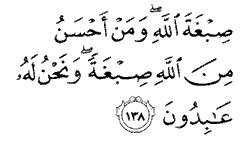Baptism of God, Gift of Obedience, Rights
Issue 871 » December 4, 2015 - Safar 22, 1437
Living The Quran
Baptism of God
Al-Baqara (The Cow) - Chapter 2: Verse 138
 "The baptism of God, and who is better than God in baptism? And we are worshippers of Him."
"The baptism of God, and who is better than God in baptism? And we are worshippers of Him."
The baptism of God renders sibghat Allah, which could also be translated "the coloring of God." The verb sabagha means "to dye," which involves plunging cloth in liquid and more generally means to cause someone to enter into something. The baptism of God can refer back to the creed of Abraham or it can be read as an adverbial clause connected to We believe in God. Thus one explanation is that the baptism (sibghah) is the primordial nature (fitrah) in human beings, which they bear the way a cloth bears its original color and which is the upright religion.
Some commentators mention Christian baptism and understand this verse to assert the superiority of Islam, as the true baptism of God, over the Christian rite. Other interpretations include sibghah as "purification" and also as the wont of God, God's "wont" being His unchanging actions in relation to the world. For others the sibghah may denote God's religion. These interpretations can be seen as complementary, as God's wont, religion, creed, and purification have overlapping significance, and all are brought out by the range of meaning in the term sibghah in the sense of an original dye or coloration by God in the fabric of existence.
Compiled From:
"The Study Quran: A New Translation and Commentary" - Seyyed Hossein Nasr
Understanding The Prophet's Life
Gift of Obedience
The Prophet once said that whoever has a mustard seed of arrogance in his heart will not enter Heaven, a sentiment shared with Christianity. What God asks from obedient people is simply acknowledging that their obedience is a gift from God. The Prophet said, "Do not find fault in others. If you find fault in them, God may take their faults away and give them to you." It is unbecoming for a believer to look with scorn at those in tribulation, exhibiting a loathsome disdain toward others who seem unguided. It is better to come with compassion toward them and gratitude to God. When the Prophet saw people severely tried, he made the supplication: "Praise be to [God] who has given me well-being such that I was not tried like these people. And He has preferred me over so much of his creation." Compassion for those in tribulation and gratitude for well-being is how the Prophet responded when he witnessed people in difficulty.
Compiled From:
"Purification of the Heart" - Hamza Yusuf, p. 71
Blindspot!
Rights
If we count the dysfunctions occurring in our societies in terms of unemployment, homelessness, discrimination, violence, racism, and xenophobia, we might well wonder how a conscience informed by a sense of moral responsibility can remain passive. This is a matter of claiming rights in the name of Right: many Muslims passively submit to harassment, racist remarks, and discrimination that are unacceptable. All people, as citizens, are responsible for claiming their rights and gaining respect. Society does not hand out rights as one offers privileges: they are a matter of law, respect, even compulsion. Standing between the bureaucracy that does not do its work, officials who allow themselves to make unwarranted insinuations, police officers who are rough and impolite, and those who suffer this treatment, there is the law, and it is sometimes right to fight for it to be respected. In all circumstances it is right to resist the victim mentality by refusing to sink into emotional complaining that brings isolation or a blind rebellion that brings exclusion.
This must be done for oneself, as well as for others. Associations such as CAIR (the Council of American Islamic Relations) in the United States and Canada and FAIR (Forum Against Islamophobia and Racism) in Britain have emerged that defend the rights of Muslim citizens (by fighting against all kinds of discrimination) because they are often silent if not consenting victims and many of them do not know what action to take. These are important developments: the Anglo-Saxon system naturally supports this kind of community defense, but it is still necessary to resist the temptation to shut oneself away in a minority enclave that may give the sense that "one's community" is against the system. It is for this reason that it is urgent to create partnerships with other organizations that work more widely in the same areas so that a plural front can be established against injustice, discrimination, and xenophobia in the name of all citizens without differentiation.
On a broader scale, commitment to the rights of the most disadvantaged social classes and the social spaces that have been left out of the economic prosperity in Western societies must also not be neglected. Within the community, this will be a good way of re-establishing links between affluent Muslims and those who have been left out of the general prosperity. This refers not to a merely "charitable" solidarity but rather to the development of a dynamic of resistance so that legitimate social and economic rights can be claimed. The social commitment of Muslims should not be restricted to a patronizing and good-natured solidarity. If Western societies are our societies — and they are — and if glaring injustices are visible and sometimes institutionalized, then we must say so and reject them and fight, with all the others who are fighting, to demand our rights, and not simply hope for kindness or say compassion.
Compiled From:
"Western Muslims and The Future of Islam" - Tariq Ramadan, pp. 153, 154